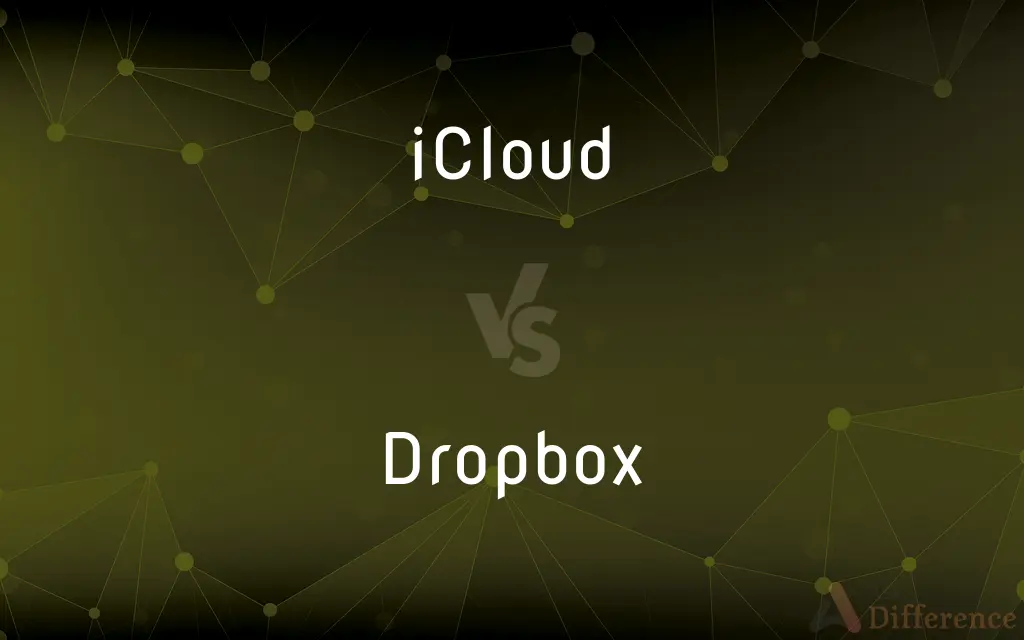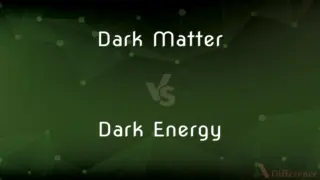iCloud vs. Dropbox — What's the Difference?
By Urooj Arif & Fiza Rafique — Published on March 15, 2024
iCloud is integrated with Apple's ecosystem, offering seamless syncing for Apple users, while Dropbox excels in cross-platform file sharing and collaboration.

Difference Between iCloud and Dropbox
Table of Contents
ADVERTISEMENT
Key Differences
iCloud is deeply integrated into Apple's ecosystem, providing a seamless experience for users of Apple devices by automatically syncing photos, documents, and other data across all their devices. On the other hand, Dropbox offers a platform-agnostic approach, focusing on providing file storage, sharing, and collaboration features that work across any device, including Windows, Mac, Linux, iOS, and Android.
iCloud's strength lies in its ability to automatically backup and synchronize user data across iOS devices, making it an essential service for users heavily invested in the Apple ecosystem. Whereas Dropbox excels in its sharing capabilities, allowing users to easily share files and folders with others, regardless of whether they use Dropbox or not, making it ideal for collaboration.
When it comes to storage plans, iCloud offers several tiers that are competitively priced, especially for users who require integration with Apple services. Dropbox, on the other hand, provides flexible plans tailored to individuals, teams, and businesses, often with more features focused on collaboration and advanced file management.
iCloud benefits from Apple's focus on privacy and security, with features like end-to-end encryption for certain data types, making it a strong choice for users concerned with data security. Dropbox also emphasizes security but has faced criticism in the past over privacy concerns, though it has made significant strides in improving its security measures.
While iCloud is designed to work best within the Apple ecosystem, limiting its functionality somewhat on non-Apple devices, Dropbox's platform-independent design ensures full functionality across all devices, making it a versatile choice for users with diverse device ecosystems.
ADVERTISEMENT
Comparison Chart
Ecosystem Integration
Optimized for Apple devices
Cross-platform, works on any device
File Sharing & Collaboration
Limited sharing outside Apple ecosystem
Extensive sharing and collaboration features
Storage Plans
Competitive pricing within Apple ecosystem
Flexible plans for individuals to businesses
Security & Privacy
Strong, with end-to-end encryption for certain data
Improved security measures, with past concerns
Best Use Case
Apple users needing seamless device syncing
Users requiring cross-platform collaboration
Compare with Definitions
iCloud
Cloud Storage Service
ICloud automatically syncs photos and documents across all Apple devices.
Dropbox
Cloud Storage Platform
Dropbox allows users to store files online and access them from any device.
iCloud
Photo Library
ICloud Photo Library automatically updates photos across all devices.
Dropbox
Collaboration Tools
Dropbox Paper facilitates collaboration on documents in real-time.
iCloud
ICloud Drive
ICloud Drive allows users to store files and access them from any Apple device.
Dropbox
Version History
Dropbox keeps a version history, allowing users to recover older versions of files.
iCloud
Backup Solution
ICloud provides backup solutions for iOS devices, ensuring data is safe.
Dropbox
File Sharing
Dropbox users can share files and folders with anyone, even if they don’t have a Dropbox account.
iCloud
Find My iPhone
ICloud offers the Find My iPhone feature, helping users locate their lost devices.
Dropbox
Cross-platform Syncing
Dropbox ensures files are synced across Windows, Mac, Linux, iOS, and Android devices.
Dropbox
(computing) A computer folder to which files may be dragged and dropped and from which users of other computers on the network can access those files.
Common Curiosities
Is Dropbox free to use?
Dropbox offers a free basic plan with limited storage, with paid plans for additional features and storage.
What is iCloud mainly used for?
iCloud is primarily used for backing up and syncing data across Apple devices.
Does iCloud offer file sharing with non-Apple users?
iCloud does offer file sharing, but its functionality is more seamless within the Apple ecosystem.
How secure is iCloud?
iCloud is considered secure, offering end-to-end encryption for certain types of data.
Can I use Dropbox on an iPhone?
Yes, Dropbox can be used on an iPhone through its iOS app.
What makes Dropbox unique?
Dropbox's cross-platform functionality and strong collaboration features make it unique.
Can I collaborate on documents in iCloud?
Yes, iCloud allows document collaboration through iCloud Drive and Pages, Numbers, and Keynote.
How much free storage do iCloud and Dropbox offer?
iCloud offers 5GB of free storage, while Dropbox offers 2GB in its free plan.
Can I increase my storage on iCloud?
Yes, iCloud offers various paid plans to increase storage.
What is the maximum file size for iCloud?
iCloud Drive supports files up to 50GB in size for each file.
Is Dropbox suitable for team use?
Yes, Dropbox offers plans specifically designed for teams, with collaboration tools.
How does iCloud work with Photos?
iCloud automatically syncs photos across all your Apple devices via iCloud Photo Library.
Does Dropbox support version history?
Yes, Dropbox supports version history, allowing users to recover older versions of files.
Can I access Dropbox files offline?
Yes, Dropbox allows users to mark files for offline access.
How does Dropbox handle large files?
Dropbox can handle large files, with some plans offering support for files up to 100GB.
Share Your Discovery

Previous Comparison
English Bulldogs vs. American Bulldogs
Next Comparison
Dark Matter vs. Dark EnergyAuthor Spotlight
Written by
Urooj ArifUrooj is a skilled content writer at Ask Difference, known for her exceptional ability to simplify complex topics into engaging and informative content. With a passion for research and a flair for clear, concise writing, she consistently delivers articles that resonate with our diverse audience.
Co-written by
Fiza RafiqueFiza Rafique is a skilled content writer at AskDifference.com, where she meticulously refines and enhances written pieces. Drawing from her vast editorial expertise, Fiza ensures clarity, accuracy, and precision in every article. Passionate about language, she continually seeks to elevate the quality of content for readers worldwide.














































